Affordable Family Health Insurance: Top Picks for 2025
- dustinjohnson5
- Apr 11
- 18 min read
Navigating the Family Health Insurance Landscape
Finding affordable family health insurance can be challenging. This guide presents eight leading health insurance providers for 2025 to simplify your search. We'll cut through the confusion, highlighting key coverage options, costs, and benefits for each provider, empowering you to choose a plan that protects your family and your budget. The tools below will help you compare plans and find the best value.
1. America First Financial
America First Financial presents itself as a haven for conservative families seeking affordable and values-aligned insurance solutions. This provider specializes in a range of policies designed to protect your family and financial well-being, from unexpected health crises to planning for retirement. Their emphasis on traditional values and a commitment to avoiding politically charged agendas resonates with a specific segment of the population looking for insurance options that align with their worldview. This makes them a noteworthy option for conservative American families, individuals approaching retirement, and budget-minded insurance shoppers seeking value-driven coverage. They aim to offer peace of mind not only through their policies but also through their philanthropic efforts, donating a portion of their earnings to charitable causes.

One of the most touted features of America First Financial is their streamlined online quote system. In under three minutes, you can receive a tailored quote for various insurance needs, including health, term life, disability, annuities, and long-term care. This quick and easy process makes it convenient for busy families and individuals to explore their options without lengthy consultations or complicated paperwork. While specific pricing details aren't readily available without going through the quote process, the company emphasizes affordability as a core principle. This focus on cost-effectiveness is particularly attractive to budget-conscious consumers seeking maximum value for their insurance dollars.
Pros:
Speed and Convenience: The rapid online quote system makes comparing insurance options incredibly efficient.
Tailored Solutions: Policies are designed to address specific family and individual needs, covering various life stages and potential challenges.
Value-Aligned: Explicitly caters to conservative values, offering an alternative to companies perceived as promoting conflicting ideologies.
Philanthropic Commitment: A portion of every dollar earned is donated, aligning financial security with charitable giving.
Endorsements: Supported by influential figures within the conservative sphere, adding a layer of credibility for potential customers.
Cons:
Limited Scope: Focuses solely on insurance products, potentially requiring customers to seek other financial services elsewhere.
Targeted Values: The explicit focus on conservative values may alienate individuals with different perspectives.
Pricing Transparency: While affordability is emphasized, detailed pricing information requires engagement with the quote system.
Implementation/Setup Tips:
Getting started with America First Financial is straightforward. Visit their website (https://www.americafirstfinancial.org) and navigate to the quote section. Be prepared to provide basic information about yourself and your family to receive a personalized quote. While the company’s target audience is clear, it’s important to thoroughly review the policy details to ensure the coverage aligns with your specific requirements and financial goals. Comparing their offerings with other insurance providers, even those outside their niche, is crucial for making informed decisions.
America First Financial deserves a spot on this list due to its unique value proposition. It fills a specific need within the insurance market, catering to a demographic that often feels underserved by mainstream providers. By combining speed, affordability, and a commitment to conservative principles, America First Financial offers a distinct alternative for those prioritizing these values in their financial planning.
2. Blue Cross Blue Shield
Blue Cross Blue Shield (BCBS) stands out as a significant player in the health insurance landscape, particularly for families seeking broad coverage and a reliable network. With a federation of 35 independent and locally operated companies, BCBS offers a wide range of plans catering to diverse needs and budgets, covering over 106 million Americans. This extensive network makes it a practical choice for families who prioritize access to a large pool of doctors and hospitals, minimizing the hassle of finding in-network care, even when traveling or relocating within the U.S. For individuals approaching retirement, this nationwide coverage can offer peace of mind as healthcare needs evolve and potentially require specialized care in different locations.
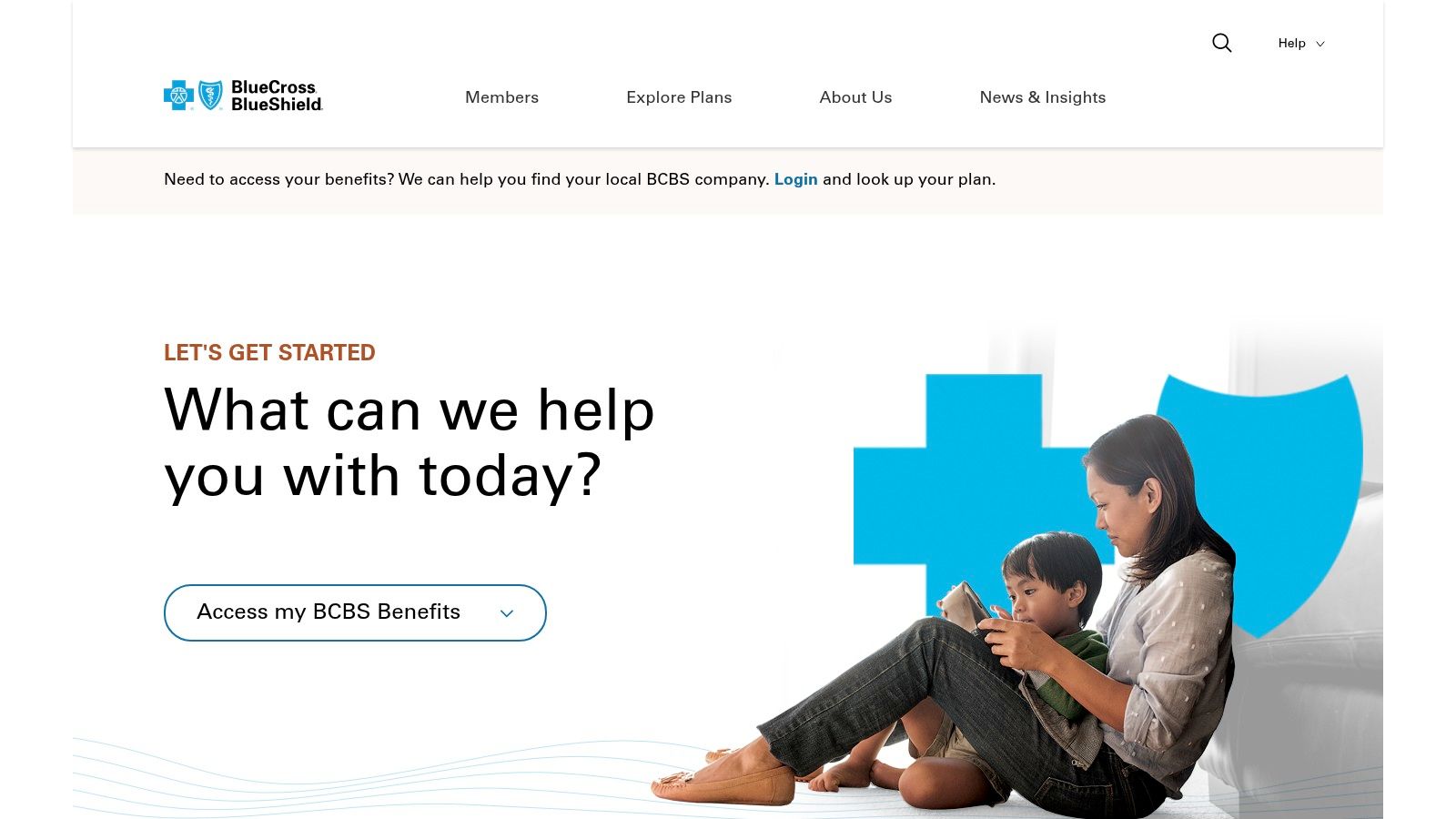
BCBS provides a diverse portfolio of plans, including Preferred Provider Organizations (PPOs), Health Maintenance Organizations (HMOs), and high-deductible health plans (HDHPs), offering flexibility for families to choose a plan that aligns with their financial situation and healthcare preferences. For budget-minded insurance shoppers, comparing these various plan options is crucial, considering factors like premiums, deductibles, co-pays, and out-of-pocket maximums. Conservative families, often valuing established institutions, will appreciate BCBS's long-standing reputation and financial stability, assuring them of consistent coverage and access to quality care. Furthermore, many BCBS plans include dental and vision coverage, simplifying healthcare management by bundling these essential services under a single provider. Health-conscious consumers can benefit from BCBS’s emphasis on wellness programs and preventive care benefits, often included in their plans, promoting proactive health management and potentially reducing long-term costs.
BCBS's Blue Distinction Centers program designates facilities specializing in specific complex and costly medical procedures, offering potential cost savings and access to expert care. This can be especially relevant for families facing specific health challenges or individuals approaching retirement, providing reassurance of access to high-quality specialized treatment when needed. The BCBS mobile app further enhances user experience, providing convenient access to claims, digital ID cards, and provider search tools. This technological advantage streamlines administrative tasks and facilitates quick access to essential information.
While BCBS offers numerous advantages, it's important to consider potential drawbacks. Pricing can be higher compared to some competitors, particularly for those seeking the most comprehensive coverage. Plan availability and specific features can also vary by state and region due to the federated structure of BCBS companies. Finally, customer service quality may differ based on the specific regional company handling your plan. It's advisable to research the particular BCBS company in your area and compare plans offered by different insurers to ensure you are getting the best value for your specific needs. For those eligible for subsidies through the Healthcare Marketplace, BCBS offers multiple subsidy-eligible plans, potentially reducing the financial burden of health insurance. This is a crucial consideration for budget-conscious families and individuals seeking affordable coverage options.
Website: https://www.bcbs.com/
3. Kaiser Permanente
Kaiser Permanente stands out as a unique and often cost-effective option for family health insurance, particularly for those prioritizing preventive care and a streamlined healthcare experience. Unlike traditional insurance models, Kaiser Permanente operates as both the insurer and the provider, meaning they own their hospitals, clinics, and employ their physicians. This integrated system offers a compelling alternative for families seeking coordinated care and potential cost savings. This model can be particularly appealing to conservative families and individuals approaching retirement who value stability, established systems, and comprehensive care.
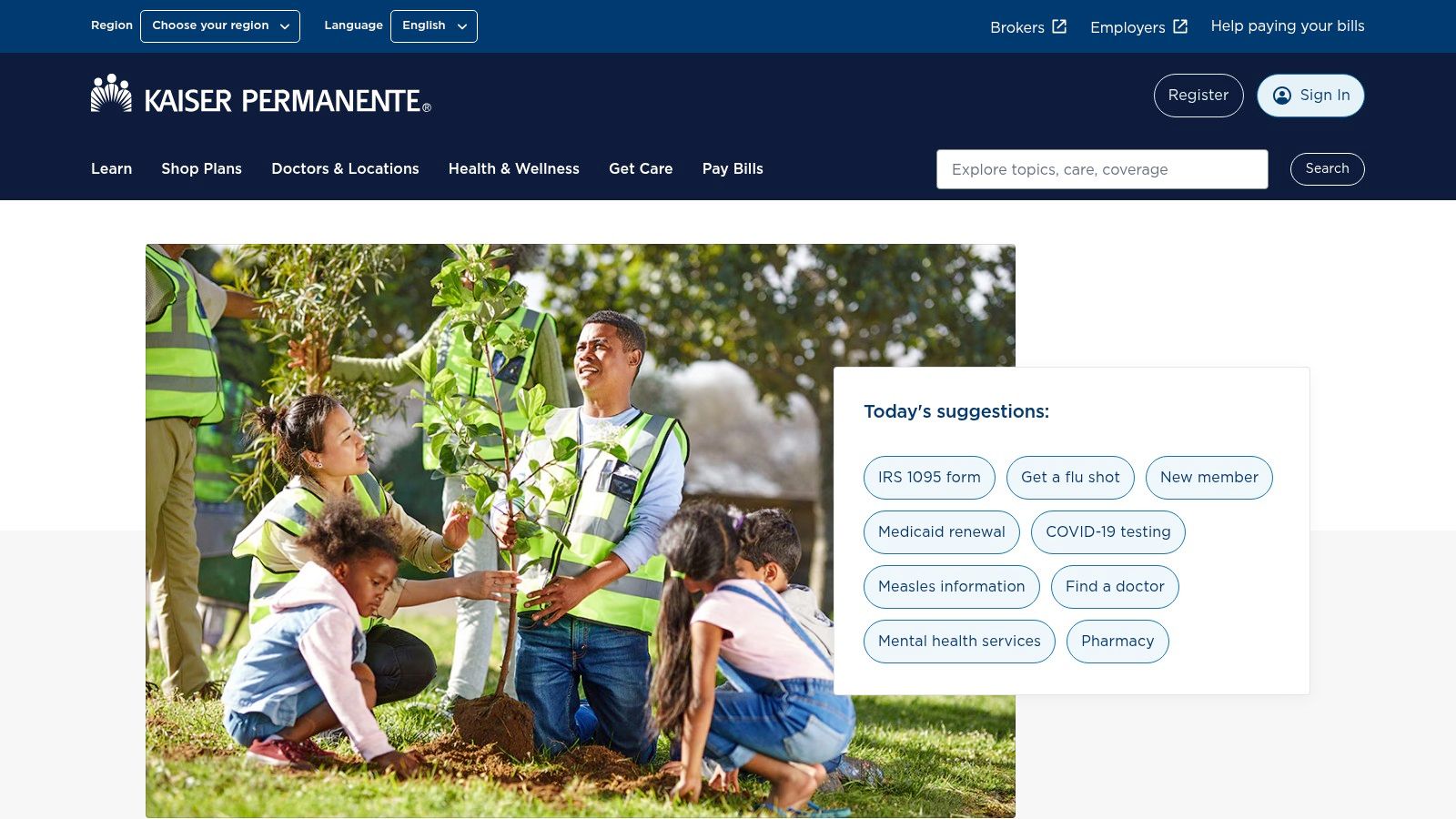
For budget-minded insurance shoppers, Kaiser Permanente's integrated model can translate to lower out-of-pocket costs compared to traditional PPO or HMO plans. Because Kaiser manages all aspects of care, from doctor visits to hospital stays and prescriptions, they can often negotiate better prices and streamline administrative processes, passing some of these savings on to members. This is a significant advantage for families looking to control healthcare expenses. Health-conscious consumers will also appreciate Kaiser's emphasis on preventive care and wellness programs, which are often seamlessly integrated into their care plans.
Kaiser Permanente's comprehensive digital platform further enhances its appeal. Their user-friendly app provides access to telehealth appointments, medical records, prescription refills, and appointment scheduling, all within a single system. This can be a significant time-saver for busy families and particularly helpful for those approaching retirement who might appreciate the convenience and ease of use. This integrated digital experience sets Kaiser apart from many traditional insurers who might have fragmented online tools.
However, Kaiser Permanente isn't without its limitations. Geographic availability is a major constraint, as they currently operate in only eight states and the District of Columbia. This limits its viability for families residing outside these service areas. Furthermore, Kaiser Permanente's closed network means you are generally restricted to seeing Kaiser-affiliated physicians and specialists. While this contributes to coordinated care, it limits flexibility for those who prefer a wider choice of providers or have established relationships with specialists outside the Kaiser system. The restricted network can be a drawback for those who value choice and flexibility in their healthcare providers.
Key Features & Benefits:
Integrated Care: Streamlined experience with medical records, pharmacy, and specialists all within one system.
Preventive Care Focus: Emphasis on wellness programs and preventive screenings.
Digital Tools: Comprehensive app for telehealth, appointments, and medical records management.
Potentially Lower Costs: Integrated model can lead to lower out-of-pocket expenses compared to traditional insurance.
Pros:
Coordinated care with less paperwork
Often lower out-of-pocket costs
Consistently high ratings for quality of care
Excellent digital experience
Cons:
Limited geographic availability
Restricted provider network
Limited flexibility in choosing specialists
Ultimately, Kaiser Permanente provides a unique approach to healthcare that may be ideal for families seeking a simplified, integrated experience with an emphasis on preventive care and cost-effectiveness. If you live within their service area and prioritize coordinated care over provider flexibility, Kaiser Permanente is certainly worth considering. For individuals approaching retirement and patriotic individuals who value established American institutions, Kaiser's long-standing presence in the healthcare landscape may offer peace of mind. However, it's crucial to weigh the pros and cons carefully, considering your family's specific needs and preferences regarding provider choice and geographic location.
4. UnitedHealthcare
UnitedHealthcare, the nation's largest health insurer, offers a compelling option for families seeking comprehensive coverage. With over 50 million members, their vast network and diverse plan options make them a significant contender for your healthcare dollars. This makes them particularly appealing to conservative families who value established institutions and wide availability. For those approaching retirement, understanding Medicare Advantage options through UnitedHealthcare is also crucial, and their presence nationwide simplifies the transition.
Why UnitedHealthcare Deserves a Spot on This List:
UnitedHealthcare's size and scope translate to tangible benefits for consumers. Their enormous network simplifies finding in-network doctors, especially valuable for families with diverse healthcare needs or those living in rural areas. Furthermore, their focus on digital tools and wellness programs resonates with health-conscious individuals seeking proactive health management. Finally, for budget-minded shoppers, their range of plans, from high-deductible to PPOs, allows for customized coverage to fit a variety of financial situations.
Features and Benefits:
Extensive Network: UnitedHealthcare boasts one of the largest provider networks in the country, giving you access to a wide range of doctors, specialists, and hospitals. This is a crucial factor for families who prioritize choice and access to quality care.
Virtual Care Options: Many UnitedHealthcare plans offer virtual doctor visits with no or low copays, making healthcare more accessible and convenient. This feature is especially beneficial for routine check-ups, managing chronic conditions, or addressing minor ailments, saving time and money.
Wellness Programs and Incentives: UnitedHealthcare provides robust wellness programs designed to help members stay healthy and manage their well-being. These may include incentives like gym membership discounts or rewards for participating in health-related activities, appealing to health-conscious families.
Plan Variety: They offer a spectrum of plan types—PPO, HMO, EPO, and high-deductible health plans (HDHPs)—allowing you to select the best fit for your family's needs and budget. This flexibility is key for those approaching retirement who may be considering HDHPs paired with Health Savings Accounts (HSAs).
Integrated Pharmacy Benefits: UnitedHealthcare integrates pharmacy benefits through OptumRx, streamlining prescription management and potentially offering cost savings on medications.
Pros:
Broadest Network: Access to a vast network of providers nationwide.
Strong Digital Tools: User-friendly mobile app and online portal for managing your health information and claims.
Value-Added Perks: Many plans include extras like gym memberships or fitness tracker discounts.
Nationwide Availability: Accessible in all 50 states.
Cons:
Premium Costs: Premiums can be higher compared to some competitors, requiring careful budget consideration.
Customer Service: Some customers report challenges with customer service, a factor to consider when evaluating insurers.
Prior Authorizations: Certain procedures or medications might require pre-approval, potentially adding an extra step to your healthcare journey.
Pricing:
UnitedHealthcare plan pricing varies depending on factors like your location, age, family size, and chosen plan type. It's best to get a personalized quote directly from their website or by contacting a UnitedHealthcare representative. Remember to compare quotes from several insurers to ensure you're getting the best value for your money.
Implementation/Setup Tips:
Utilize Online Tools: The UnitedHealthcare website and mobile app offer valuable resources for finding providers, managing claims, and accessing your plan information.
Explore Wellness Programs: Take advantage of any wellness programs and incentives offered by your plan to maximize your benefits.
Understand Your Plan Details: Carefully review your plan documents to understand coverage limits, deductibles, copays, and out-of-pocket maximums.
Website: https://www.uhc.com/
UnitedHealthcare's strengths lie in its vast network, diverse plan choices, and emphasis on digital health tools. However, it's essential to weigh the potential for higher premiums and customer service challenges against these benefits. By thoroughly researching and comparing your options, you can make an informed decision about whether UnitedHealthcare is the right fit for your family's healthcare needs.
5. Cigna
Cigna distinguishes itself by focusing on whole-person health, integrating medical, behavioral, and pharmacy benefits into their plans. This makes them a strong contender for families seeking comprehensive coverage that addresses both physical and mental wellbeing. Their emphasis on preventive care and wellness programs, often with incentives for healthy behaviors, can be particularly attractive to health-conscious consumers and those looking to establish long-term healthy habits. Cigna also offers various affordability options like HSA-compatible plans and tiered networks, appealing to budget-minded shoppers looking to balance cost and quality. For families with chronic conditions, Cigna’s integrated approach can streamline care and potentially reduce long-term costs.
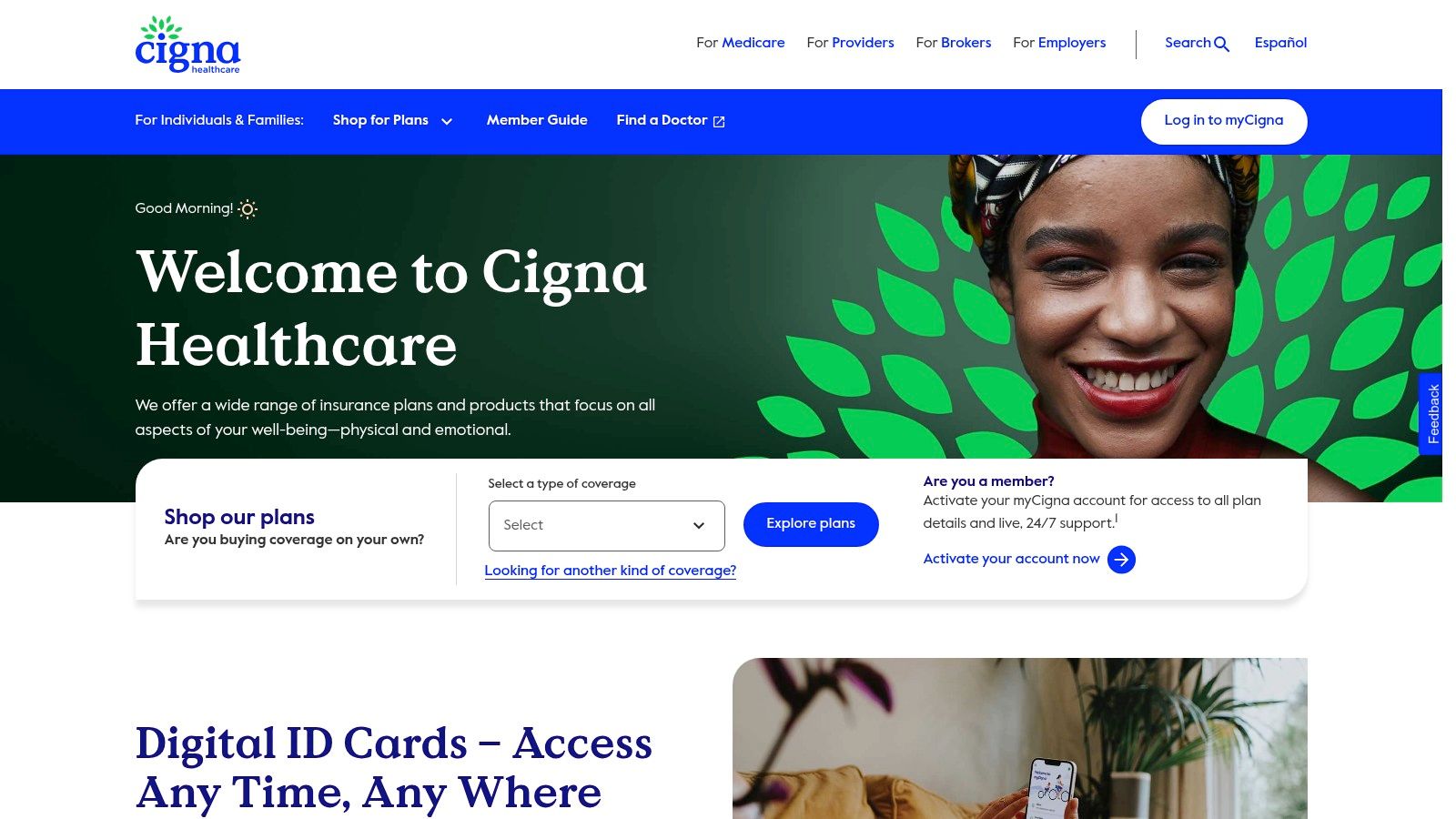
Cigna’s commitment to whole-person health aligns well with the values of many conservative American families, who often prioritize comprehensive care and personal responsibility in health management. The emphasis on preventive care and wellness can also be attractive to individuals approaching retirement, who are likely focused on maintaining their health and managing potential long-term care costs. Furthermore, Cigna’s robust digital tools empower users to actively manage their health and insurance, offering a level of control and transparency that appeals to today’s tech-savvy consumers.
Features and Benefits:
Integrated Care: Cigna seamlessly integrates medical, behavioral health, and pharmacy benefits, simplifying healthcare management for families. This integrated approach is particularly beneficial for managing chronic conditions.
Telehealth Services: 24/7 telehealth services are available on most plans, offering convenient and affordable access to medical consultations, particularly beneficial for routine check-ups or managing minor illnesses.
Wellness Programs: Cigna provides wellness programs with incentives for healthy behaviors, encouraging proactive health management and potentially reducing long-term healthcare costs. These programs often resonate with health-conscious consumers.
Global Coverage: For families who travel frequently, Cigna offers global coverage options, ensuring access to healthcare services even while abroad.
Strong Digital Tools: Cigna offers excellent digital tools for managing health and insurance information, appointment scheduling, and accessing telehealth services. These tools can be especially valuable for busy families and those approaching retirement who prefer to manage their healthcare online.
Pros:
Strong emphasis on preventive care and overall wellness.
User-friendly digital tools for managing health and insurance.
Competitive pricing, often more affordable than other major carriers.
Robust support for individuals and families with chronic conditions.
Cons:
A smaller network than some major competitors, potentially limiting provider choices in certain areas. This is a crucial factor to consider when evaluating coverage options.
Not available in all states for individual and family plans, so availability needs to be checked based on your location.
Some plans may have high deductibles before coverage fully kicks in, which can be a barrier for budget-conscious families.
Implementation/Setup Tips:
When considering a Cigna plan, carefully review the network coverage in your area to ensure your preferred doctors and hospitals are included. Use Cigna's online tools to compare plan options and pricing based on your family's specific needs and budget. Pay close attention to deductible and out-of-pocket maximums to understand your potential cost exposure.
Website: https://www.cigna.com/
Cigna's focus on whole-person health, combined with their digital tools and affordability options, earns them a place on this list. While their network size and plan availability may vary, their comprehensive approach and focus on wellness can be particularly beneficial for families seeking integrated and proactive healthcare solutions. For those who prioritize preventive care, convenient access through telehealth, and user-friendly online tools, Cigna is definitely worth considering.
6. Molina Healthcare
Molina Healthcare stands out as a budget-friendly option specifically designed for low-income families and individuals. If you're navigating a tight budget, especially if you're approaching retirement or raising a family on a modest income, Molina deserves a close look. Their focus on affordability, combined with a commitment to serving underserved communities, makes them a valuable resource for families seeking essential healthcare coverage without breaking the bank. They achieve this affordability largely through their participation in Medicaid, Medicare, and the Affordable Care Act (ACA) Marketplace. Their Marketplace plans are often among the most competitive options for families who qualify for government subsidies, which can significantly reduce your monthly premiums.
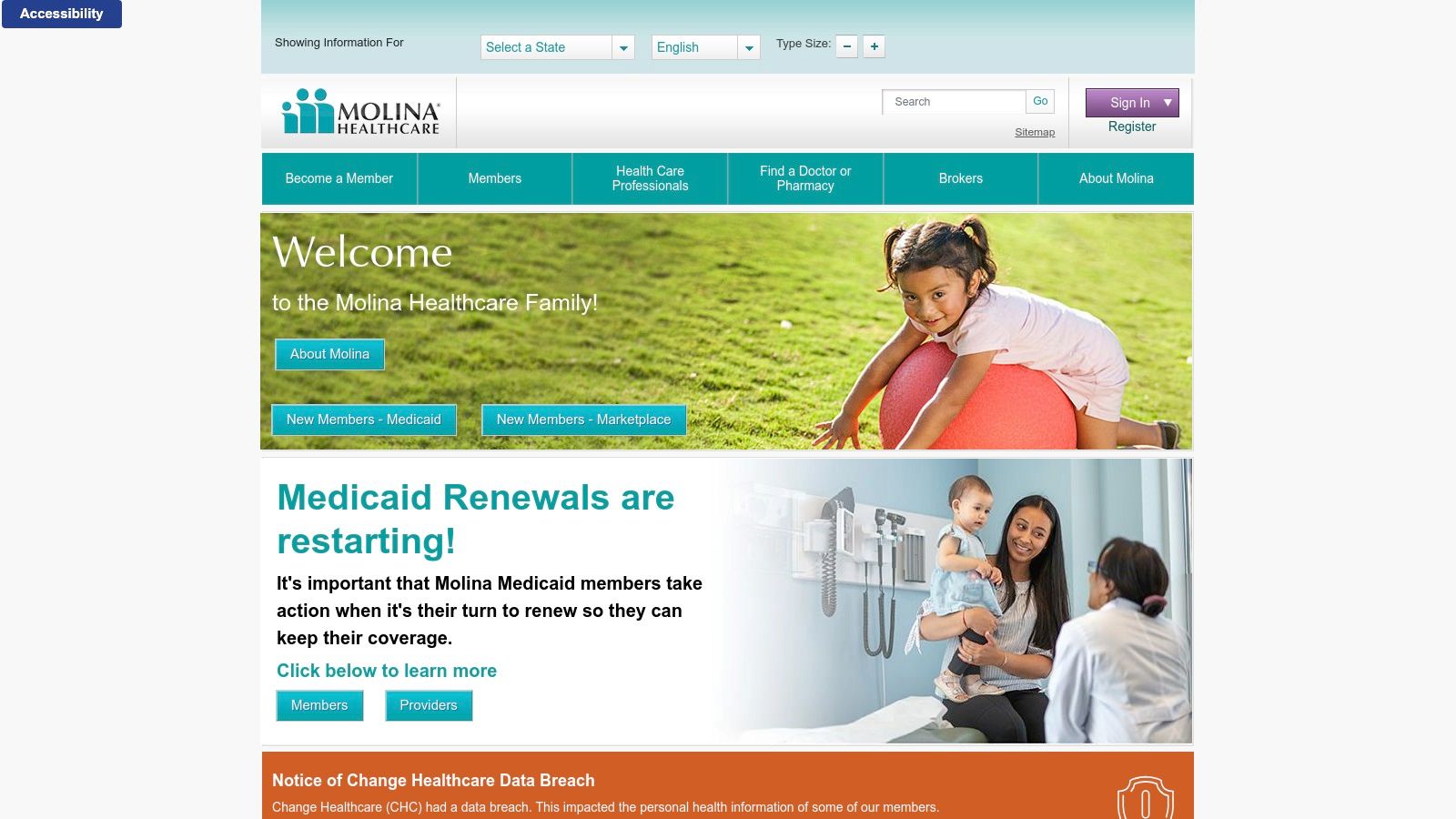
Founded by an emergency room physician, Molina emphasizes preventive care, which aligns with a health-conscious approach to well-being. This proactive focus can lead to better long-term health outcomes and lower overall healthcare costs, a win-win for families. They offer low or no copays for preventive services, encouraging regular check-ups and screenings.
Key Features and Benefits:
Low-premium plans: Molina offers some of the most affordable health insurance plans available, particularly for those who qualify for subsidies through the ACA Marketplace. This can be particularly beneficial for budget-minded families and individuals approaching retirement.
Subsidy eligibility: Molina’s plans are designed to work with the ACA subsidy program, making them even more accessible to lower-income households. Be sure to explore your subsidy eligibility during the open enrollment period to maximize potential savings.
Preventive care focus: Molina emphasizes preventive care with low or no copays, helping you stay healthy and avoid costly medical issues down the road. This aligns with a conservative approach to healthcare, prioritizing personal responsibility and long-term well-being.
Case management: For individuals with complex medical needs, Molina offers dedicated case managers who can help navigate the healthcare system and ensure access to appropriate care. This is invaluable for families dealing with chronic illnesses or complex medical situations.
Bilingual support: Molina provides bilingual customer service and materials, catering to the diverse needs of American families.
Telemedicine: Molina offers extended hours telemedicine options, providing convenient access to medical consultations from the comfort of your home.
Pros:
Affordability: Molina consistently ranks among the most affordable options, especially for subsidy-eligible families.
Specialized experience: Their focus on lower-income families translates to a deep understanding of their specific healthcare needs.
Community outreach: Molina is actively involved in community support services, reflecting a commitment to the well-being of the populations they serve.
Simple plan structures: Their plans are generally easy to understand, reducing the complexity often associated with health insurance.
Cons:
Limited provider networks: Compared to premium carriers, Molina may have a smaller network of doctors and hospitals. Be sure to check if your preferred providers are in-network.
Fewer extra perks: Molina plans may not offer the same range of extra benefits (e.g., gym memberships, vision discounts) as some larger insurers.
Availability: Molina Healthcare is not available in all states. Check their website to confirm availability in your area.
Customer service wait times: Some users have reported longer wait times for customer service.
Website: https://www.molinahealthcare.com/
Implementation Tip: When considering Molina, carefully review the provider network to ensure your preferred doctors and hospitals are included. Also, utilize their online resources or contact their customer service to understand your subsidy eligibility and explore the plan options available in your state. Comparing Molina's offerings with other affordable options like Ambetter or Oscar Health can help you make an informed decision. Don't hesitate to take advantage of the resources available during open enrollment to explore your options and select the plan that best suits your family's needs and budget.
7. Aetna (CVS Health)
Aetna, now a subsidiary of CVS Health, provides a range of family health insurance plans emphasizing integrated care and convenient access. This makes them a solid option for families, especially those already utilizing CVS services. Their close relationship with CVS pharmacies and MinuteClinics allows for streamlined access to routine care, prescriptions, and even minor medical needs, which can be a significant advantage for busy families and those with young children. Aetna also prioritizes preventive care, offering wellness programs aimed at helping families stay healthy and manage healthcare costs proactively. This resonates with conservative values of personal responsibility and cost-consciousness.
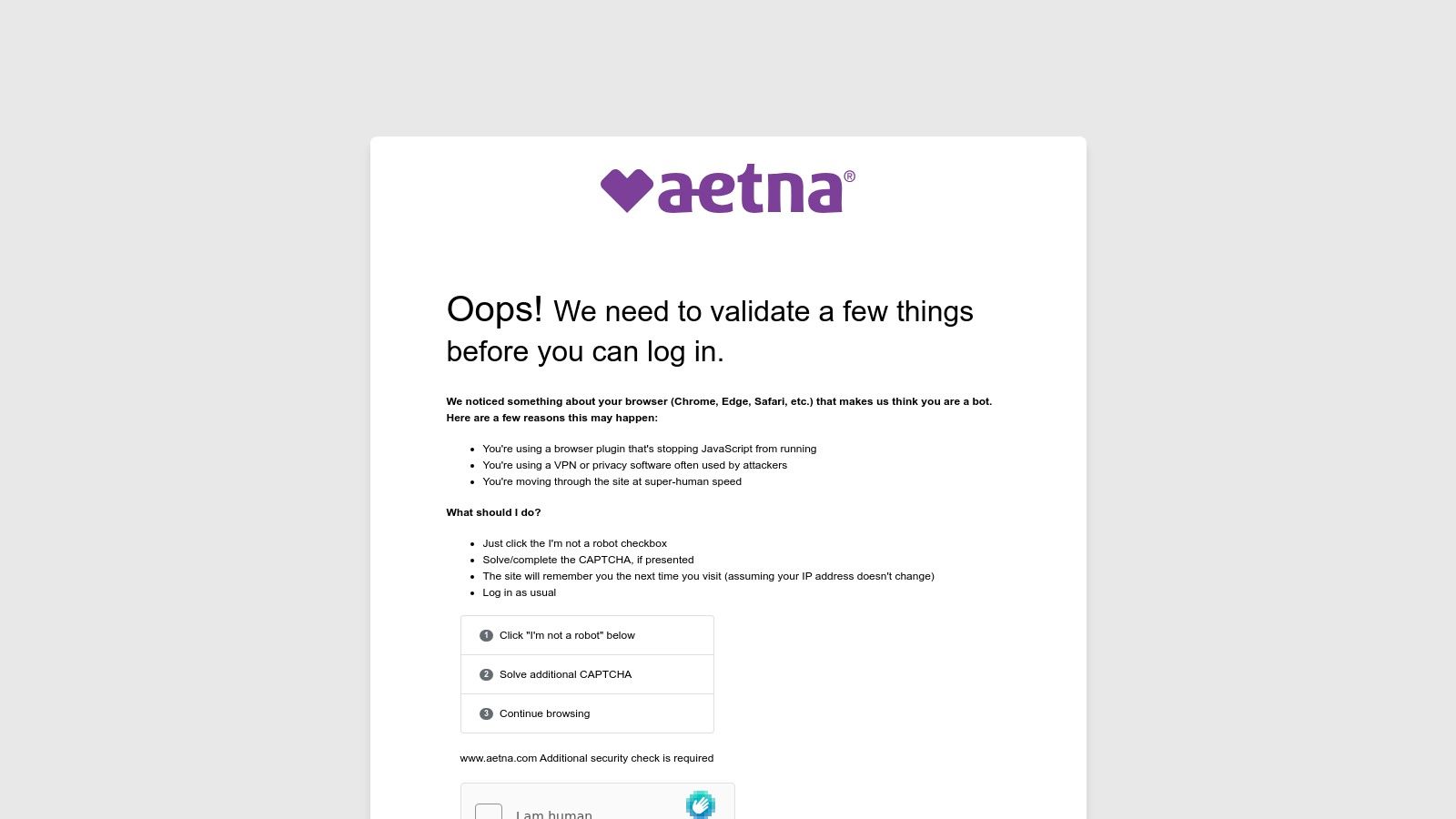
Aetna deserves a place on this list due to its focus on value and accessibility, particularly for those comfortable with the CVS ecosystem. Features such as integrated MinuteClinic access can translate to significant time and cost savings for routine matters, aligning with the needs of budget-minded consumers. For individuals approaching retirement, Aetna's care management programs for chronic conditions can provide peace of mind and contribute to long-term health security.
Key Features and Benefits:
Integration with CVS MinuteClinics: Convenient access to basic healthcare services, including vaccinations, screenings, and minor illness treatment, often with lower co-pays than a traditional doctor visit. This is particularly useful for time-constrained families and those seeking quick care for common ailments.
Comprehensive Preventive Care Coverage: Aetna plans often cover preventive services like annual checkups, immunizations, and certain screenings at no additional cost, promoting proactive health management and potentially reducing long-term healthcare expenses.
Digital Tools: Aetna provides online tools and resources for finding in-network doctors, managing claims, and estimating healthcare costs. This empowers consumers to take control of their healthcare spending and make informed decisions.
Discounts on Health-Related Products and Services: Through their connection with CVS, Aetna members can often access discounts on over-the-counter medications, health products, and other services available at CVS pharmacies.
Care Management Programs for Chronic Conditions: Aetna offers support and resources for managing chronic illnesses like diabetes and heart disease, which can be especially valuable for individuals approaching retirement or those with existing health concerns.
Pros:
Convenient Care Options: The integration with CVS provides unparalleled convenience for routine care and prescription needs.
Strong National Provider Network: Aetna generally boasts a broad network of healthcare providers, ensuring access to quality care across the country.
Good Value for Mid-Range Premium Plans: Aetna can offer competitive pricing for plans with moderate premium costs.
Transparent Pricing Tools: Aetna provides tools to estimate costs, promoting informed decision-making.
Cons:
Limited Availability: Aetna's individual and family plans are not available in all states, a critical consideration for those outside their service area.
Higher Premiums for Broader Networks: Opting for plans with wider network access may come with higher premium costs.
High Deductibles: Some Aetna plans have high deductibles, requiring significant out-of-pocket expenses before coverage kicks in. This should be carefully evaluated by budget-conscious shoppers.
Website Navigation Challenges: Some users find navigating the Aetna website to be complex and potentially confusing.
Implementation/Setup Tips:
Carefully review plan details and coverage options to ensure they align with your family's specific needs and budget. Pay close attention to deductible amounts, co-pays, and out-of-pocket maximums.
Utilize Aetna's online tools to estimate costs and compare different plan options.
Check if your preferred doctors and specialists are within Aetna's network before enrolling.
Take advantage of the wellness programs and preventive care benefits to maximize the value of your coverage.
Website: https://www.aetna.com/
8. Ambetter
Ambetter, the Marketplace brand of Centene Corporation, focuses solely on providing Affordable Care Act (ACA) Marketplace health insurance plans. This makes them a key player for families and individuals seeking coverage, particularly those who qualify for subsidies. Ambetter's mission centers on affordability and serving underserved communities, making it a valuable resource for many Americans, particularly those in rural areas or with limited income. They offer a range of plan options (Bronze, Silver, Gold) to fit different needs and budgets, making comparing coverage levels relatively straightforward.
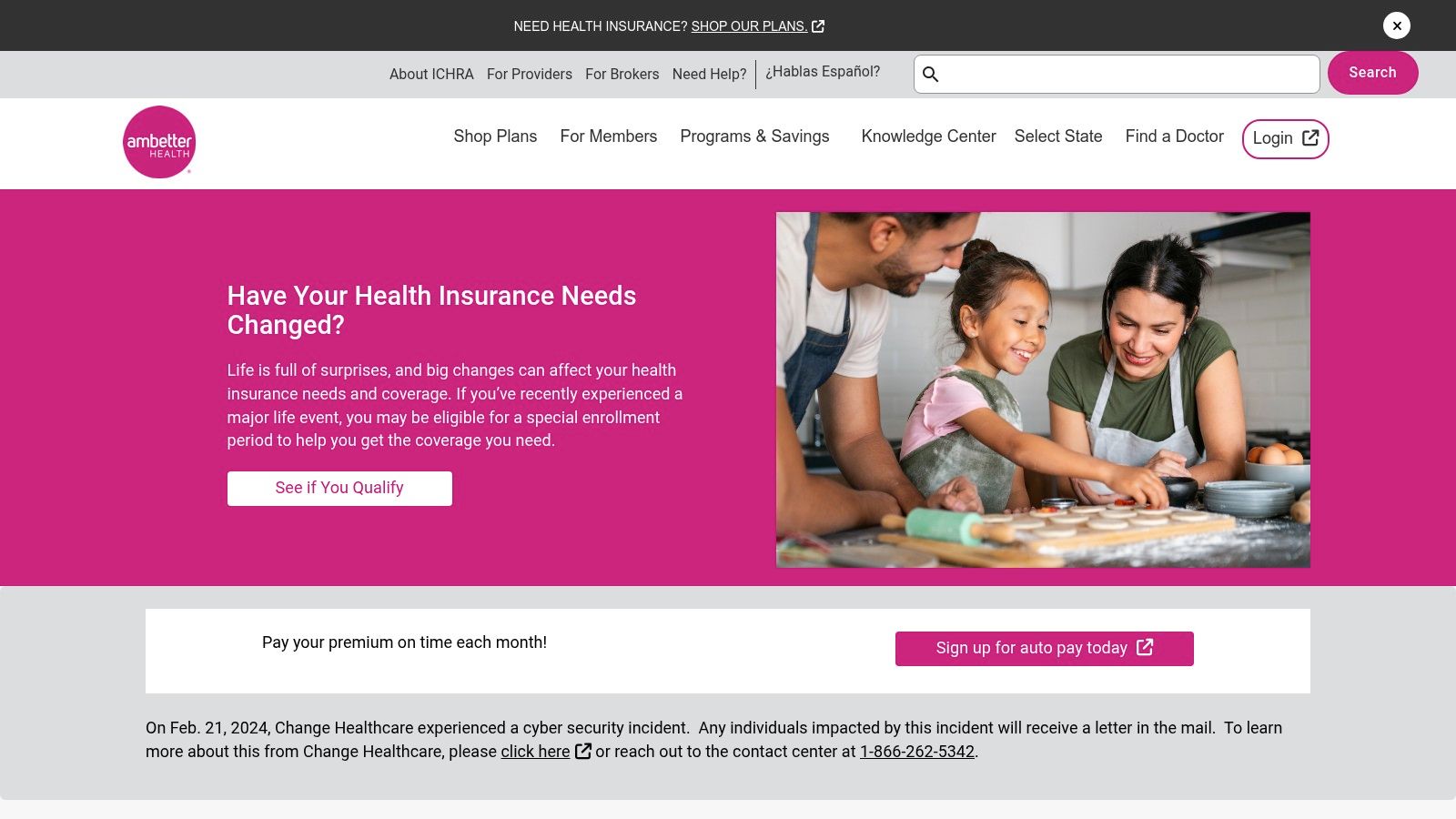
For conservative American families and individuals approaching retirement on a fixed income, Ambetter's emphasis on affordability is a significant advantage. The tiered plan structure (Bronze, Silver, Gold) allows for a clear understanding of coverage levels and costs, simplifying the often-complex process of choosing a health plan. This transparent approach can resonate with budget-minded insurance shoppers and those seeking value for their healthcare dollars.
Ambetter’s focus on the ACA Marketplace means they are designed for individuals and families who qualify for premium tax credits (subsidies). These subsidies can significantly lower monthly premiums, making health insurance more accessible for families with modest incomes. This is particularly relevant for those approaching retirement who might be living on a fixed income.
Health-conscious consumers can benefit from Ambetter's "My Health Pays" rewards program, which incentivizes healthy activities. While specifics vary by state, this program can provide tangible rewards for engaging in healthy behaviors, appealing to those prioritizing wellness. The 24/7 nurse advice line and the "Start Smart for Your Baby" program for expectant mothers offer additional support for families focused on preventative care.
Ambetter also offers telehealth services with a $0 copay on many plans. This can be a convenient and cost-effective option for routine consultations, especially for families in rural areas with limited access to healthcare providers.
While Ambetter's focus on affordability and accessibility makes it an attractive option, it's essential to consider the potential downsides. Ambetter's provider networks tend to be smaller than those of larger, premium carriers. This might mean fewer choices in doctors and specialists, which could be a drawback for individuals with specific healthcare needs or those who prefer a broader range of providers. Customer service reviews are also mixed, varying regionally. Finally, Ambetter’s coverage isn't nationwide, so it’s crucial to check availability in your area before making a decision.
Implementation Tip: To determine if Ambetter is available in your area and to compare plans and pricing based on your specific needs and subsidy eligibility, visit their website during the Open Enrollment Period or a Special Enrollment Period if you qualify: https://www.ambetterhealth.com/
Ambetter earns its place on this list by providing a focused and affordable option for families and individuals navigating the ACA Marketplace. Its targeted approach to affordability, combined with features like the "My Health Pays" rewards program, caters to budget-conscious consumers and those prioritizing value in their healthcare coverage. However, it’s important to carefully weigh the pros and cons, considering network size and customer service reviews, before deciding if Ambetter is the right fit for your family.
8 Affordable Family Health Insurance Providers Comparison
Provider | Key Features ✨ | User Experience ★ | Value 💰 | Target Audience 👥 |
|---|---|---|---|---|
🏆 America First Financial | Tailored policies, fast online quote (<3 min) | Quick & convenient service | Affordable, value-driven | Conservative, patriotic families |
Blue Cross Blue Shield | Nationwide network, varied plan options | Reliable digital support | Trusted, though pricier | Broad US families |
Kaiser Permanente | Integrated care model, robust digital tools | Coordinated care, lower out-of-pocket | Competitive pricing, quality care | Families in select states |
UnitedHealthcare | Extensive network, virtual care options | Strong digital tools, extra perks | Nationwide coverage, mid-high pricing | US families & individuals |
Cigna | Whole-person coverage, wellness benefits | User-friendly management | Affordable with preventive focus | Families managing chronic needs |
Molina Healthcare | Subsidy-eligible, low-premium plans | Simple and accessible services | Highly affordable for low-income | Underserved, low-income families |
Aetna (CVS Health) | CVS integration, comprehensive preventive care | Convenient but mixed website ease | Transparent mid-range pricing | Nationwide families seeking convenience |
Ambetter | ACA-focused plans with subsidy eligibility | Simplified plan structures | Budget-friendly with healthy rewards | Subsidy-eligible, rural families |
Securing Your Family's Future with Affordable Healthcare
Finding the right health insurance for your family is a crucial step in securing their well-being and financial stability. This article explored eight prominent providers – America First Financial, Blue Cross Blue Shield, Kaiser Permanente, UnitedHealthcare, Cigna, Molina Healthcare, Aetna (CVS Health), and Ambetter – each offering diverse plans and options to fit various needs and budgets. Key takeaways include the importance of comparing quotes, understanding coverage details, and considering factors such as provider networks and prescription drug coverage. Remember, the most affordable plan isn't always the best; finding the right balance between cost and comprehensive coverage is paramount.
To effectively utilize the information presented, consider your family's specific healthcare needs, anticipated medical expenses, and preferred doctor network. Some tools, like online comparison platforms, can help streamline the process of gathering quotes from different insurers, allowing you to see the costs and benefits side-by-side. When implementing any new health insurance plan, be sure to thoroughly review the policy documents and understand the terms and conditions.
Protecting your family’s health is a patriotic duty, and securing affordable, quality healthcare is an investment in a brighter future. By taking proactive steps and using the resources available, you can make informed decisions that empower you to safeguard your family's health for years to come.
For personalized guidance and support in navigating the complexities of health insurance and financial planning, consider exploring the resources available at America First Financial. They can provide valuable insights and resources specifically tailored to help conservative American families secure their financial future, including finding affordable and comprehensive health insurance options. Learn more at America First Financial.
_edited.png)
Commentaires